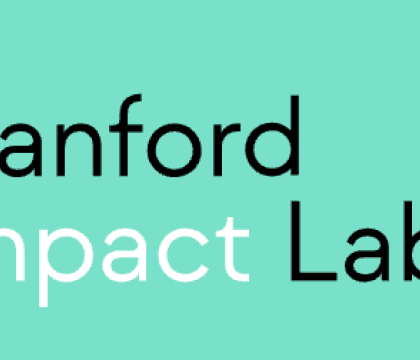Scholars in Service Application
Stanford Impact Labs and the Haas Center for Public Service are accepting applications for the fourth cohort of Scholars in Service, a program that supports faculty to take a period of leave from the university and embed themselves within a government or nonprofit organization.
The program provides compensation (salary and benefits) support for up to two quarters of leave, as well as support for direct travel and housing costs. Additionally, we provide one-on-one support in creating a program of focus for the leave and offering guidance throughout the period of service.
Eligibility
PI-eligible Stanford scholars may apply. Successful applicants will also need to explore the feasibility and logistics of taking leave within their respective schools/departments, and placements will only be confirmed with the consent of the respective department Chair and school Dean. Interested applicants are encouraged to review the Faculty Handbook section on Sabbaticals and Other Leaves of Absence.
Application Criteria
Competitive applicants will clearly articulate how the Scholars in Service experience will enhance their understanding of a particular social problem and lead to important insights that will advance their research agenda or inform elements of their scholarship, such as teaching and advising.
Successful placements are mutually beneficial to the scholar and host organization. Therefore, competitive applicants will further articulate the contribution they will make to the host organization during their leave.
Competitive applicants will have already identified, and be in conversation with, the organization in which they plan to embed themselves for the leave. For prospective participants who are interested in the program but have yet to identify a partner/host organization, please submit an expression of interest here and a member of our team will contact you to discuss further.
Competitive applicants will clearly articulate their goals for the leave and be well-positioned to craft a scope of work that is compelling and feasible.
Finally, competitive applicants will:
- demonstrate a commitment to both scholarly research and public service
- exhibit curiosity, humility, and a learning mindset
- recognize and appreciate the complementary expertise of hosting institutions.
Program Requirements
Awardees will meet with the Stanford Impact Labs and Haas team to discuss the goals of the placement and map out key areas of support with a plan of action for tracking progress. All participants will be expected to have regular check-ins on progress (frequency depends on length of leave) and provide an end-of-term report, narrating the high-level activities and outcomes of the leave, including how it contributed to the progress of the host organization, the applicant’s own research objectives, and both short-term and anticipated longer-term public outcome benefits.
Application Instructions and Materials
To be ensured of full consideration, please send your complete application materials no later than Monday, March 27, 2023, to scholarsinservice@stanford.edu with the subject line: “Scholars in Service Application Submission.”
Complete applications should include the following two documents (please download and complete each document):
- Scholars in Service application form (download application form here).
- Budget proposal for your leave (download budget template here). For any questions regarding eligible direct costs, please review this FAQ page.
Timeline
- The application deadline is Monday, March 27, 2023, at 11:59 p.m. Pacific time.
- Those advancing will be notified and invited to interview with a panel.
- Selections will be made by the end of April 2023.
- Placements may begin as early as June 2023 and extend through September 2024. For placements beginning in September 2024 or later, applicants should apply in future application rounds. If you have particular circumstances that require earlier consideration for your leave, please reach out to acarr2@stanford.edu.
Questions? Please contact Alex Carr, Stanford Impact Labs at acarr2@stanford.edu.
